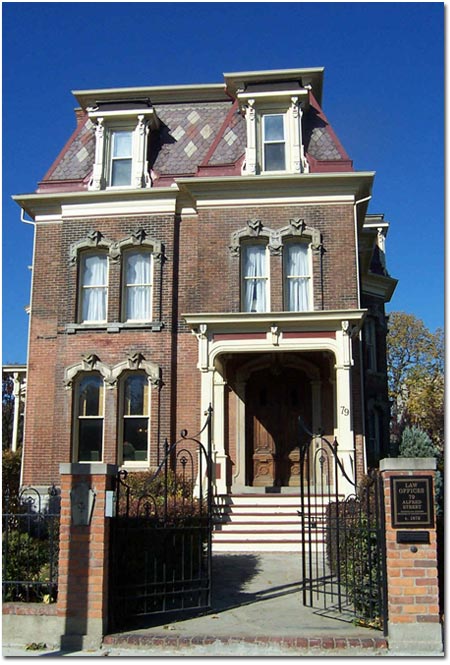
Built circa 1872, this Victorian house, which is listed on the State and National Historic Registries, serves as the Law Offices of VanOverbeke, Michaud, & Timmony, P.C.
79 ALFRED STREET
BRUSH PARK HISTORIC DISTRICT
In 1798, Attorney Elijah Brush settled in Detroit in what is now known as the Brush Park Historic District. Built in the Victorian style, the three story brick house was a wedding gift from David Whitney, Jr. to his daughter Grace upon her marriage to John Evans in 1872. Grace Whitney-Evans went on to become the first president of the Detroit YWCA and was awarded an honorary Doctor of Law degree. The home later became the residence of the J. L. Hudson family. The Hudson/Evans House is listed on both the national and state historic registries. The building now serves as the law offices of VanOverbeke, Michaud & Timmony, P.C.
A HISTORY OF BRUSH PARK
Brush Park is one of Detroit’s most historic neighborhoods. Originally, Brush Park was the farm belonging to the Askin family. In the early to mid 18th Century, settlers of Detroit were given property along the river front. According to the style of all French settlements, property started at the river and extended north for one or two miles. These long, but narrow farms, known as “ribbon farms”, now coincide with streets along their property boundaries and named for farmers such as Beaubien and Chene. In the late 1700’s, the Askin farm was owned by John Askin and his wife Marie Archarge (Barthe). They had one daughter, Adelaide Askin.
In1798, Elijah Brush, a Dartmouth educated lawyer from Vermont, moved to Detroit and later married Adelaide Askin in 1802. When John Askin died in 1806, Elijah Brush took over the Askin farm. Elijah and Adelaide Brush had four children: Edmund Askin, Charles Reuben, John Alfred, and Archange (Samantha). Elijah Brush was very influential in Detroit and later became Detroit’s second Mayor and was United States Attorney. Upon the death of Elijah Brush in 1813, his eldest son Edmund took over the family estate. Edmund A. Brush became instrumental in the development of Detroit. Among serving in various City positions, from City register to President of the Water Commission, he has been credited with the organization of the Detroit Boat Club and a volunteer fire department. E. A. Brush, a primary stockholder in many Detroit businesses, owned large amounts of real estate throughout the City.
In the 1850’s Edmund Brush began selling off land in what is now known as Brush Park. The earliest street in Brush Park, Winder, opened in 1852, and is named after John Winder, who was a prominent attorney and friend of E. A. Brush. The northern boundary of the neighborhood, Mack Avenue (originally named Rowena), opened in 1878. During the late 1800’s, the land within Brush Park was subdivided into large and expensive lots with building restrictions requiring purchasers to construct elaborate homes within a specific time frame. The City’s elite lumber, shipbuilding and merchant families built substantial two and three story brick and stone residences in the popular Victorian styles of the day. By the end of the 19th Century, Brush Park was known as “Little Paris” and was characterized by majestic mansions. At the turn of the century, Brush Park became the center of residence for the Jewish community, and new institutions (Pewabic Pottery) supplemented those already established. The expansion of industry into Detroit brought several changes to the neighborhood in the1910’s. A number of larger scale, multi-family residences and “corner stores” (typically attached to the single family residences) were also built.
By the 1930’s, Brush Park became a significant section of Paradise Valley. The neighborhood later provided the industrial base for the automotive explosion which soon followed. Brush Park is a vital part of Detroit’s history and has been home to many notable and influential Detroiters including: J. L. Hudson, founder of the J. L. Hudson Company; lumber baron David Whitney; Michigan Supreme Court Justice James Campbell; Delos E. Rice, founder of the Fulton Iron Works; Emma Thomas, one of Detroit’s leading music teachers; Albert Kahn, renowned architect; art collector Charles Freer; realtor Joseph Weber; and philanthropist Grace Whitney Huff.
Copyright © 2003-Present VanOverbeke, Michaud & Timmony, P.C.
